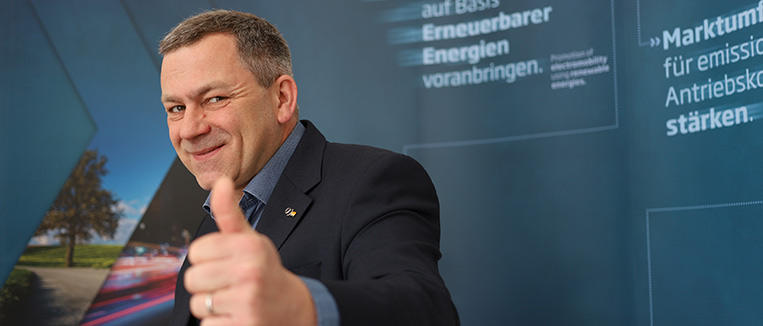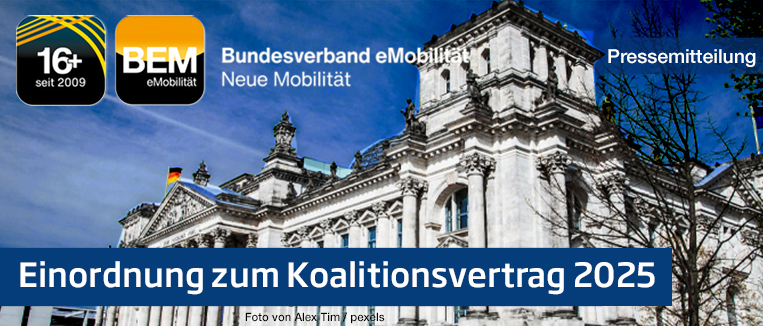
Political steering effect on electromobility
Electromobility is at the centre of discussions about a sustainable future and the design of a green economy. In view of this importance, the Bundesverband eMobilität emphasises the crucial role of politics in creating the appropriate framework conditions for a sustainable energy and transport transition, which not only brings ecological but also economic benefits.
The German eMobility Association is therefore calling on politicians to fulfil their responsibility and resolutely drive forward the necessary measures to promote electromobility, including the charging infrastructure. We can only master the challenges of the future and ensure sustainable mobility that simultaneously creates jobs, increases value creation, promotes prosperity and protects the environment by consistently deploying political steering effects.
A commentary by BEM board member Christian Heep on the political steering effect on electromobility:
Clear measures for a sustainable and future-proof green economy
Electromobility is at the centre of discussions about a sustainable future and the design of a green economy. In view of this importance, the Bundesverband eMobilität emphasises the crucial role of politics in creating the appropriate framework conditions for a sustainable energy and transport transition, which not only brings ecological but also economic benefits.
A central issue that characterises the political debate is the creation and preservation of jobs, the strengthening of value creation and the promotion of prosperity through increased investment in new mobility and associated technologies. It makes no sense to continue to rely on fossil or traditional business models, to give them political preference and even to promote and subsidise them, while at the same time the financial resources for sustainable business models in an internationally established and sustainable green economy are limited or subject to cuts and cancellations. As recently happened, for example, with the abolition of subsidies for e-cars and the use of cost-cutting measures based on the KTF judgement as an argument for this. This is an unbelievable farce and damages the credibility of politics at national and European level. In particular, this has a negative impact on the general willingness of and in companies to invest, sends out completely the wrong signals and has absolutely nothing to do with planning and investment security. We urgently need to make strategic investments in the future, at least to the extent that all fossil and backward subsidies are abolished asap. With over 200 billion climate-damaging subsidies per year, these funds would be much better and more socially justly placed in the green economy.
In particular, the FDP-led Ministry of Transport under Volker Wissing, with its blockade stance regarding the speed limit, its eFuel and hydrogen dreams and the decoupling of its sectors, is making a massive contribution to not achieving our climate and environmental goals and to driving Germany as a technology centre to the wall in international comparison. On the opposition side, Friedrich Merz and Markus Söder are heading in the same direction and are doing the economy a disservice. We should look to the past from time to time: Germany was already the world market leader, leading supplier and world export champion in some sectors in the field of the green economy. We have lost over 120,000 jobs in photovoltaics, around 40,000 jobs in the wind industry, we only play a minor role in battery production, China is in the fast lane for e-buses and e-cars and unfortunately things don’t look much better in many other sectors. Instead, we have created just 20,000 jobs in the coal industry and given the companies billions to get out of a technology that they themselves did not want to continue operating, which is harmful to the climate and the environment and also tends to hinder the integration of renewable energies into the grid. This is truly not a policy for the future, but at best a very transparent climate policy.
We can do that and have invented, enabled and brought much of it to market here. The companies in the German eMobility Association alone represent an innovative industry of the future that is capable of improving many of our processes and requirements and making them possible with significantly less impact. When will political decision-makers finally realise that the green economy has incredible potential? From the point of view of the FDP and the CDU, from a purely economic point of view, this means nothing other than a clear commitment to the technological performance of our economy, combined with massive support for small and medium-sized enterprises. The achievement of climate and environmental goals is a positive side effect. From the Greens’ point of view, this side effect is superficial, but in the context of a green economy it clearly coincides with the economic benefits, allows for social justice (hello SPD) and enables diversification, a circular economy and many other green ideas – without standing in the way of a prosperous economy. A classic win-win situation. What’s so hard to understand about that?
Policymakers must therefore pursue a clear strategy aimed at strengthening and maximising the acceleration of the transformation processes in the energy and mobility industry as drivers of a green economy. In this context, it is crucial that politicians show significantly more technological determination and make targeted investments in the development and expansion of electromobility. This is the only way to fully utilise the ecological and economic potential. In addition, European laws, e.g. on the decarbonisation of fleets via CSRD, AFIR or EnEfG, already set corresponding requirements that must be transposed into national legislation anyway.
The German eMobility Association is therefore calling on politicians to fulfil their responsibility and resolutely push ahead with the necessary measures to promote electromobility, including the charging infrastructure. We can only master the challenges of the future and ensure sustainable, intermodal mobility that simultaneously creates jobs, increases added value, promotes prosperity and protects the environment by consistently developing a political steering effect.






